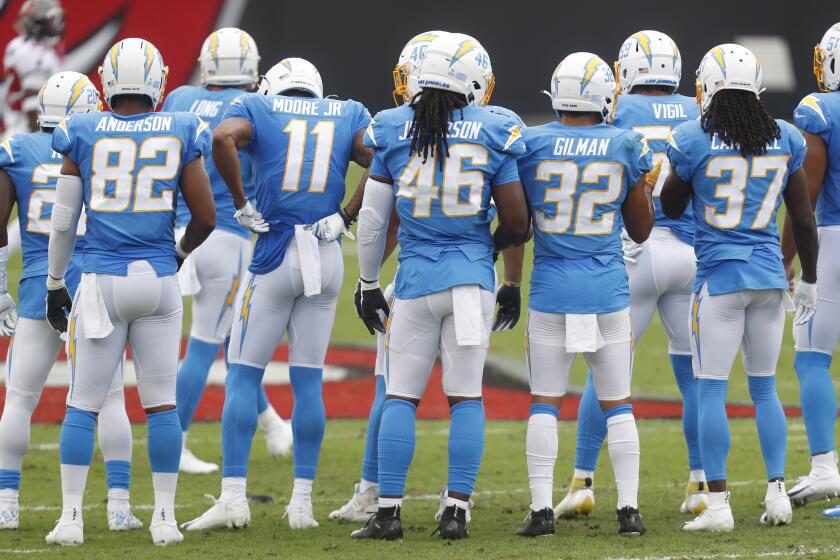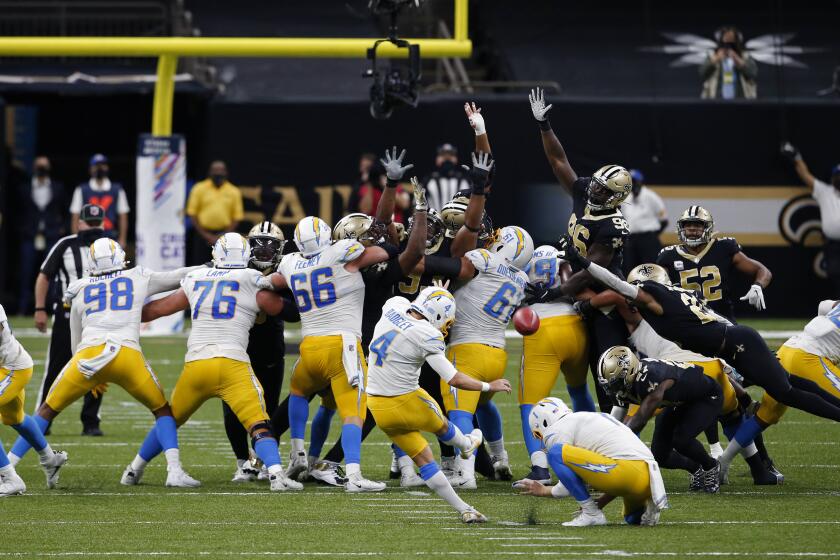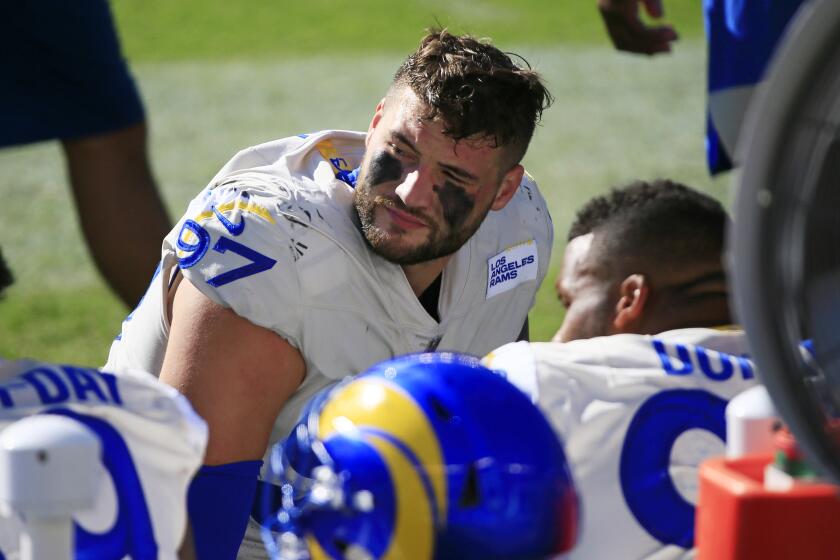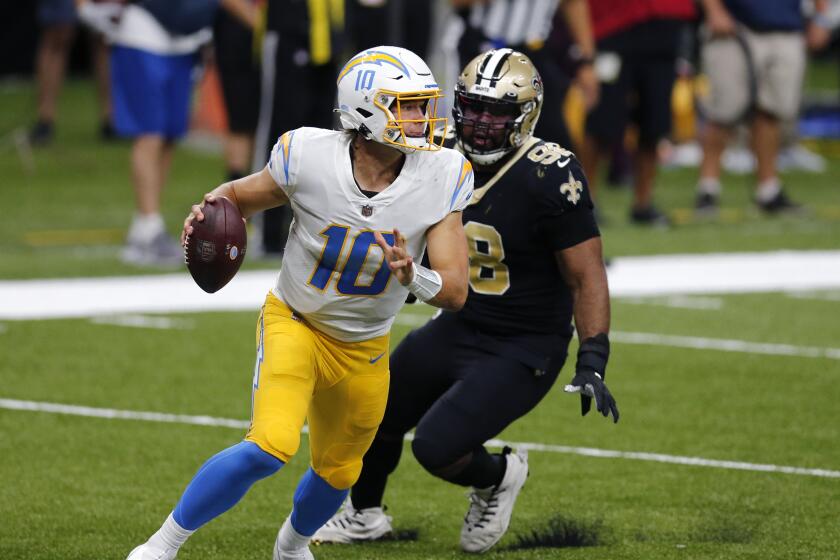Chargers keep losing close games, and clutch finishes are key to teams such as 4-1 Rams
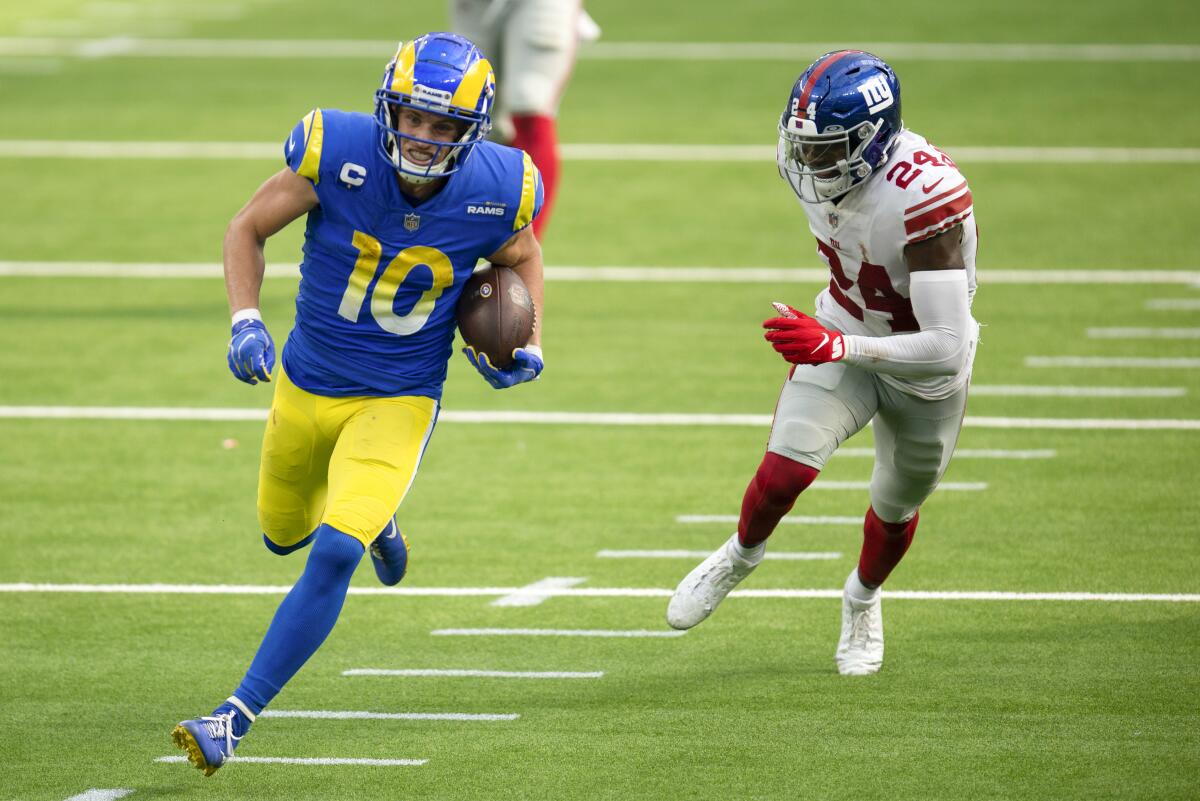
- Share via
Jared Goff trotted onto the field knowing the Rams offense needed to wake up.
The Rams had scored only one touchdown against the winless New York Giants. Three second-half drives had ended in punts. Leading 10-9 with nine minutes left, the quarterback motivated his teammates.
“I don’t care what’s happened until this point,” Goff said. “Let’s go out and let’s score and win the game.”
They did. The Rams orchestrated a fast-paced, eight-play drive that culminated with Cooper Kupp’s 55-yard catch-and-run touchdown. The defense sealed the victory in the closing seconds when cornerback Darious Williams intercepted a pass near the goal line.
More than 2,000 miles away in Tampa, rookie quarterback Justin Herbert watched as the Chargers defense relinquished a 24-7 first-half lead.
Trailing the Buccaneers 38-31 before the two-minute warning, Herbert sailed a pass in the middle of the field. Buccaneers defender Carlton Davis intercepted the pass, sending the Chargers to a third consecutive loss decided by seven points or fewer.
“You go through ups and downs and peaks and valleys in games, but you have to be able to pull through, execute and make the plays to win the damn game,” Chargers coach Anthony Lynn said.
The NFL was looking to move the minimum amount of games to accommodate the postponement of Broncos-Patriots. The solution was to essentially redraw the Chargers’ schedule.
The dichotomy between Los Angeles’ two NFL teams presents an interesting case study. Though they share SoFi Stadium, they contrast in end-of-game situations. They’re different teams, with different personnel and different circumstances.
But their performances raise a common question: How do you close out and finish games, and what does it take to get it done?
The Chargers have struggled for an answer. Since last season, they are 3-13 in games decided by one score.
No. 13 came Monday when the Chargers blew a 17-point lead for the second consecutive week and lost at New Orleans in overtime after kicker Michael Badgley’s last-second field-goal attempt in regulation hit the upright.
A wrenching Chargers season continued Monday when they blew a 17-point, first-half lead for the second consecutive week in a 30-27 overtime loss against the New Orleans Saints.
“I have no problem with our character, I have no problem with our leadership,” Lynn said after the game. “We just have to go back to work and fine-tune the details. Once we win one of these damn games, I really believe they will come in bunches, and I can’t wait.”
They suffered similar pain in their second game, when the defending Super Bowl champion Kansas City Chiefs overcame a 17-6 deficit and won with a field goal in overtime. Defensive coordinator Gus Bradley said the Chargers had no one to blame but themselves.
“The opportunity to go out there and close it — you earn that opportunity to be successful,” Bradley said. “Right now, we’re not doing enough things to earn that.”
Lynn and the Chargers posted a 12-4 record in 2018, tied for best in the AFC. In games decided by one score, they were 7-1. In Week 15 against the Chiefs, the Chargers overcame a 21-7 second-half deficit, scoring a two-point conversion in the final seconds to win 29-28.
Tight end Hunter Henry said players believed in themselves that season, regardless of the scoreboard. He’s hopeful that mind-set can start to translate to this season.
“Guys made plays at the end of games, and I felt like we just knew at the end of those games, especially when things were tight, we were going to come out victorious,” Henry said.
“We’re a different team than 2018, 100%, but there’s still some guys from that team here. We’ve got to just keep growing, keep grinding, and those things are going to come.”
Lynn said mental toughness is the biggest factor a team needs to win close games. It’s equally important to not allow games to become tight. That means maintaining leads and eliminating mishaps, something the Chargers haven’t done well.
At the end of the third quarter in his debut against the Chiefs, Herbert rolled left and escaped pocket pressure. He could have run for the first down, but instead threw a pass across his body that was intercepted.
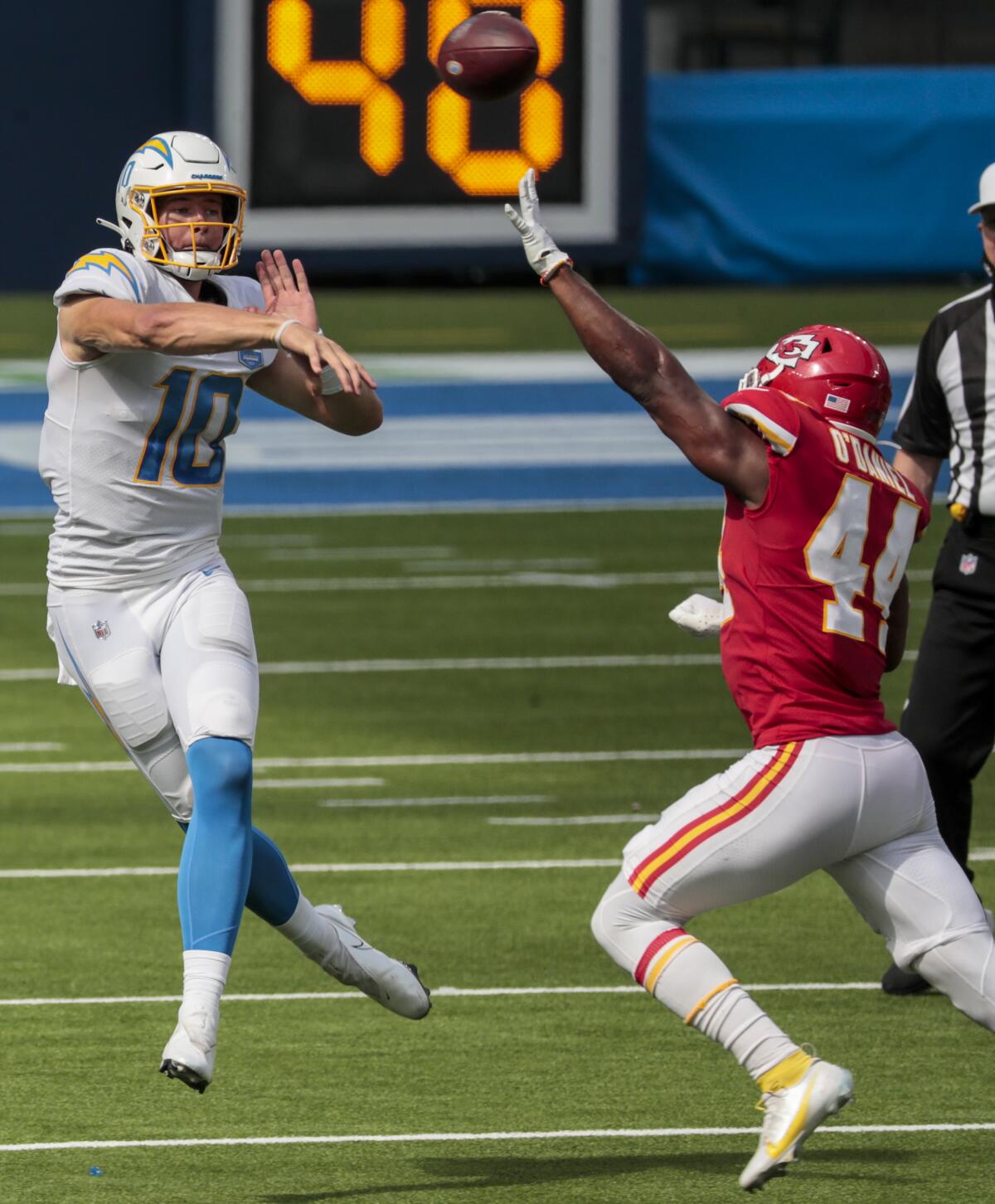
Chiefs quarterback Patrick Mahomes capitalized on the turnover, heaving a 58-yard touchdown pass to Tyreek Hill. A successful two-point conversion tied the score 17-17.
Two weeks later against Tampa Bay, the Chargers led the Buccaneers 24-7 with less than a minute before halftime. Herbert and rookie running back Josh Kelley bobbled a handoff exchange near the goal line, causing a fumble. The Buccaneers recovered and, three play later, scored.
The Chargers’ first drive in the second half stalled, and Tom Brady directed a scoring drive.
The Chargers’ cushion had vanished.
Lynn said the Chargers need more of a “killer instinct,” and Bradley said film study and practice can be refined. Herbert said the mistakes are correctable but will require a holistic approach without any finger-pointing.
“It’s going to take more than what we are doing right now,” he said after the loss Monday. “It’s going to take 30 minutes more of stretching, watching film, weight lifting, little bits that add up in the long run.
“I love the way this team battles and I know we’re going to stick together.”
The work continues with self-evaluation and preparation.
“When we watched the tape, there was self-inflicted wounds,” Bradley said. “When you’re a good team and you want to win close games, you can overcome them or not even have them in that part of the game. We want to make sure this doesn’t become a habit.”
Morgan Fox and Darious Williams are quickly establishing themselves as key components for a Rams team looking to shut down Washington on Sunday.
The Rams have fared better. They’re 2-1 in games decided by eight points or fewer. The loss could have turned out differently too. Trailing Buffalo 21-3 at halftime, the Rams came back to lead 32-28 in the fourth quarter. But a pass interference call on Williams positioned the Bills to score a late touchdown.
Otherwise, plays in key moments have helped the Rams turn momentum in their favor.
The Rams led Philadelphia 21-16 in the third quarter when Eagles quarterback Carson Wentz drove his offense to the Rams’ 21-yard line. Williams intercepted a pass in the end zone, however, to prevent a go-ahead score.
Against the Giants, the Rams’ usually-efficient offense seemed sluggish. But coach Sean McVay picked up the play-calling tempo, which caused miscommunication in the defense and set up Kupp’s touchdown.
Since 2018, the Rams are 14-8 in games decided by 10 points or fewer, including the playoffs. Much of that success resulted from what veteran left tackle Andrew Whitworth described as complementary football. The offense and defense trust each other to get the job done when it matters, he said, creating a sense of calm.
One of the few things Chargers quarterback Justin Herbert hasn’t done is win a game and Monday’s loss to the New Orleans Saints continued the trend.
“You have a feeling of relax, and knowing, ‘Hey, we’re the kind of football team that we’re in the game at all times,’” he said. “That almost makes you play better from the beginning because you really don’t have the stress and are never worried about the emotion of the game.”
McVay compared end-of-game situations to a basketball jump shooter who struggles but then finds a rhythm. His new top assistants, defensive coordinator Brandon Staley and offensive coordinator Kevin O’Connell, said they’ve emphasized those scenarios in practice. When it happens in the games, they said players are prepared.
“We put those guys through a lot of those situations the best we can, so that they can be themselves and play to their full capacity,” Staley said. “So much of those situations is just you being able to execute your assignment and technique at a high level and understanding how the opponent is trying to attack you.
“It’s one of those things where we’ve been in a bunch of those situations and I’ve been pleased with the way the guys have handled it.”
More to Read
Go beyond the scoreboard
Get the latest on L.A.'s teams in the daily Sports Report newsletter.
You may occasionally receive promotional content from the Los Angeles Times.
